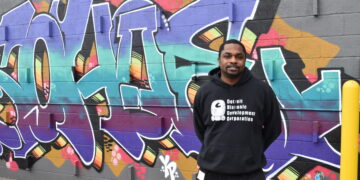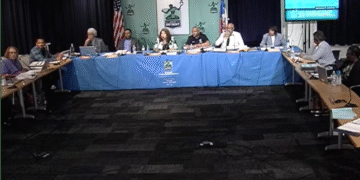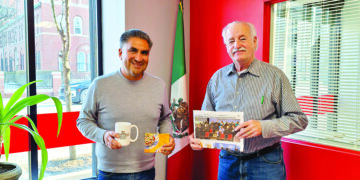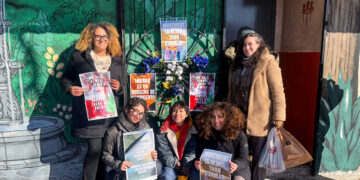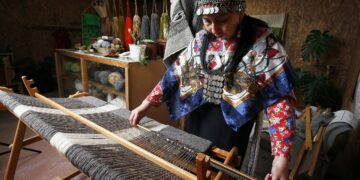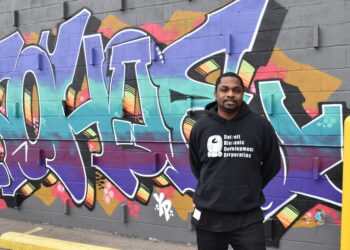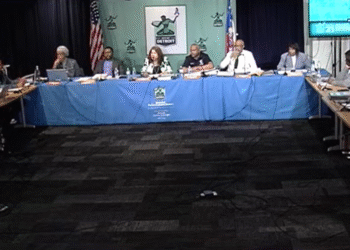When Yvonne “Heaven” Montero opened LiTO in Southwest Detroit, she wasn’t following a business plan—she was following a feeling. What started as a love for collecting vintage clothes has evolved into a brick-and-mortar shop prioritizing craftsmanship, storytelling and longevity.
In 2024, Montero, 37, was focused on building her online upcycling clothing business, Heaven in Motion, as a Bas Blue Zero-to-One Entrepreneurial Fellow when an unexpected opportunity arose – a plum space in Southwest Detroit suddenly became available.

“I loved the space and could envision myself there, but I didn’t know what that would look like,” Montero said. “I had never worked in retail. I didn’t have a business license or business credit. I just liked collecting clothing and continuing the life cycle of these pieces.”
She connected with the building owner, Mary Carmen Munoz of LA SED, a non-profit agency for the social and economic development of Hispanics and residents of Southwest Detroit, who took a “life-changing” chance on Montero.
“I didn’t have any savings; I didn’t have any investors. It was like, ‘Okay, we’re just gonna roll with what we have and make it work,’” Montero said.
Montero started selling vintage items online in 2021 amid the pandemic. Soon, she began adding her own stamp to the items – like printing the lyrics to Cher’s Believe onto a pant leg. She adopted Heaven in Motion as the name of her upcycling clothing label.
Resale and upcycled clothing are a growing market. A 2024 report from online thrift megastore ThreadUp found that the resale market grew 15 times faster than retail in 2023, with most online shopping.
A year after opening, Montero has built LiTO into a thriving resale business that embraces the growing secondhand market – and she’s turning a profit. Unlike online resale platforms that dominate the industry, her shop offers a space for customers to engage with fashion in a tangible way.
“Now, I have an employee, and we’ve been really accepted into the community of Detroit,” Montero said.
Don’t call it ‘sustainable fashion’
Extending the life of textiles has climate and human rights benefits. A 2018 UN report found the textile sector emits 2-8% of global greenhouse gases, consumes vast water resources and causes 9% of ocean microplastic pollution. Sixty-eight percent of garment workers—primarily women—face exploitation, underpayment, forced labor and health risks. And textiles generated over 17 million tons of waste in 2018, according to an EPA report – most of which ended up in landfills.
But for Montero, secondhand shopping was never about being “green”—it was a way of life. Growing up in Los Angeles in a Mexican-American family, she and her parents frequented flea markets and yard sales to find stylish, affordable clothing. Her mother loved Vogue, and her grandmother, a seamstress, would recreate Montero’s favorite magazine looks for school dances.
“We were going to yard sales or flea markets, but we still had a huge interest in beauty and romance, and I never felt like we were poor,” Montero said.
She doesn’t embrace the term “sustainable fashion,” though she said others have often “pushed” the term onto her. She’s doing it for the love of artistry.
“My place in the fashion industry is to remind someone of craftsmanship, of the importance of materials and longevity,” Montero said. “I think people are realizing that if you buy a product that has existed for 20 years, like a cotton shirt, it’s gonna exist probably for another 20 years.”
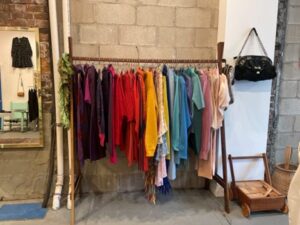
Montero sees the rise of resale as driven by affordability and consumer awareness. She said secondhand shopping was once associated with lower-income communities. Now, the middle class is embracing it —and realizing how fun it can be, she said.
She credits social media for taking away some of that stigma.
“There’s a wonderful thing happening through social media; that is, we can exchange it and not feel any shame about it,” Montero said.
Closet sales create space for resale, exchanges
Closet sales, where sellers set up a small rack of their clothes for sale, are a key feature of LiTO. Fostering those in-person exchanges is important, Montero said.
Bella Kiser, 27, a fiber artist and senior project coordinator at a climate change think tank, said she’s followed Montero’s work since 2021 on Instagram. She said it was “really exciting” to learn about her storefront opening in her neighborhood of Southwest.
Kiser said her mother introduced her to thrifting at a young age. Today, she shops secondhand to offset her carbon footprint. She said supporting businesses like LiTO helps to ease her mind.
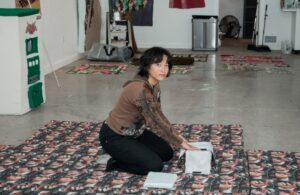
“The clothes we discard don’t just go away,” she said. “They’re still on the planet for a long time, especially if they’re made from synthetic fibers,” Kiser said. “I am conscious about the impact that larger industries like fashion are having on the environment.”
Kiser said Montero’s prices are “mid-range” for vintage, noting that she scored a Ralph Lauren sweater at LiTo for “like 20 bucks.”
“So that’s a pretty good deal to me,” Kiser said.
Montero said she prices her garments based on the condition, the materials and rarity. She said that some designers only make a limited amount of pieces, versus a brand like Banana Republic that may mass produce something.
Kiser is hoping to host a closet sale at LiTO and said she will offer a sliding scale price option.
“I am not reselling my clothes to make a bunch of money…I’m very sentimental about my clothes. I’d rather see them go to somebody than to just lose them to a thrift store, be processed, and then it goes into the landfill eventually,” Kiser said.
Making a home in Detroit
When Montero moved to Detroit in 2018, she said the city reminded her of L.A., which was full of immigrant families like hers “trying to make it.”
“When I arrived here in Detroit, I felt at home because it was such a resilient city, such a sweet city,” Montero said. “They [Detroiters] didn’t care about what you did, but they cared about who you were.”
Due to an issue getting approval on Google, LiTO operated based on social media and word of mouth for an entire year. Mostly women in their 20s or 30s walk into her store, but Montero wants to attract a broader customer base–she hopes to bring in older women and other Southwest residents, she said.
This year, Montero is focusing on increasing outreach to the Mexican-American community.
“I’m a guest here. I hope that I can honor that by bringing something to the table. I only want to add to the path of Detroit,” Montero said.
Shop LiTO is open Friday to Saturday, 1 to 7 p.m., and Sunday to Monday, 12 to 5 p.m. at 4200 W. Vernor Hwy, and open online anytime at www.shoplito.co/shop. To host a closet sale, fill out the contact form on the website or call 313-406-4051.
Isabelle TavaresCommunity Reporter, Report for America
Isabelle Tavares covers environmental and public health impacts in Southwest Detroit for Planet Detroit with Report for America. Working in text, film and audio, she is a Dominican-American storyteller who is concerned with identity, generational time, and ecology.


